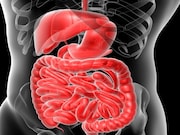Tag: Cancer: Rectal
Low Cancer Suspicion Tied to Delay in CRC Referral in Primary Care
Presentation without alarm symptoms linked to long duration to referral in multivariable analysis
High-Intensity Surveillance of Colorectal Adenomas Modeled
Model shows high-intensity surveillance could provide modest, clinically relevant benefits at acceptable cost
Colorectal Cancer Mortality Disparities Vary Across U.S. Cities
Racial disparities in 25 of 30 cities examined; highest disparity in Washington, D.C., lowest in Philadelphia
Incidence of Colorectal Cancer Up in Younger Adults Worldwide
In most high-income countries with long-term data, uptick in early-onset disease began in mid-1990s
Physical Activity, Overall Survival Not Linked in Metastatic CRC
Nine or more MET hours per week tied to lower risk for grade ≥3 treatment-related adverse events
Oral Antibiotic Use Linked to Risk for Colorectal Cancer
Risk for colon cancer increased, risk for rectal cancer reduced in association with oral antibiotic use
Younger CRC Patients More Likely to Present With Abdominal Pain
Young colorectal cancer patients more often present via emergency; have lowest percentage early-stage cancer
Proportion of CRC Diagnoses Increased in Adults Younger Than 50
Younger adults presenting with colorectal cancer present with more advanced disease than older adults
Continuous Anticoagulants + Cold Snare Polypectomy Noninferior
Findings seen among patients with subcentimeter colorectal polyps receiving oral anticoagulants
Yogurt Consumption Linked to Reduced CRC Adenoma Risk in Men
Men with two or more servings of yogurt per week have reduced risk for conventional adenoma














